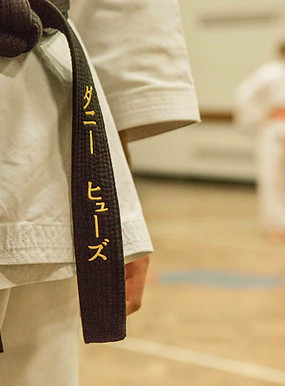FAQs


What is the purpose of karate?
Karate is a traditional martial art that develops character, discipline, and physical fitness. It also provides effective self-defence skills and helps build confidence, focus, and resilience—valuable qualities for people of all ages.
What benefits can I expect from training in karate?
Training in karate improves physical health, coordination, balance, and flexibility. It also enhances mental focus, emotional control, and self-confidence. Whether you're a child, teenager, or adult, karate can support personal growth, encourage goal-setting, and foster a sense of achievement.
What age can someone start training? Are beginners and women welcome?
We welcome students from age 8 and up. Children aged 7 may join if a parent is able to remain present during class.
Karate is for everyone—beginners, adults, and women are all encouraged to take part. Many of our students start with no prior martial arts experience.
What style of karate do you teach?
We teach Shotokan Karate, the most widely practised style in the UK. Shotokan is known for its strong, direct techniques, low stances, and structured training approach. It originated in Okinawa and was formalised in Japan. The style emphasises both physical technique and the development of character and discipline.
When are classes held?
-
Juniors (approx. ages 8–12): Wednesday & Friday, 6:30 – 7:30 pm
-
Adults & teens (13+): Wednesday & Friday, 6:30 – 8:00 pm
We ask that all students arrive at least 5 minutes before the session begins.
If you're aged 13–14, you can speak with an instructor to decide whether the junior or adult class is best suited to your comfort and experience level.
Do I need to let someone know if I can’t attend a session?
No formal notice is required for occasional absences. However, a minimum of three consecutive months of regular attendance is needed before a student becomes eligible for a grading.
What is the grading system?
Grading is a way of recognising progress in karate. Students advance through coloured belts, each representing an increase in skill and understanding:
White → Orange → Red → Yellow → Green → Purple → Purple/White → Brown → Brown with 1 stripe → Brown with 2 stripes → Black Belt (1st Dan)
Each step requires dedication, consistency, and the ability to demonstrate the appropriate techniques and kata.
Is there insurance, and who is responsible during training?
All students must register with the English Shotokan Academy (ESA) within the first two weeks of training. This provides personal insurance and a grading licence, which must be kept safe. The registration fee is £35 and is renewable annually.
Instructors are responsible for students while they are training in the dojo. We cannot supervise individuals elsewhere in the building, so please ensure safe drop-off and collection, especially for younger students.
What should I wear or bring to training?
You’ll need a karate uniform (Gi), which comes in different weights and sizes. Uniforms can be ordered through the club.
Beginners can wear loose, comfortable clothing (e.g., T-shirt and tracksuit bottoms) for their first few sessions. Please remove shoes, jewellery, and watches before stepping into the dojo.
What happens during a grading and how can I prepare?
When a student is ready (with at least three months of consistent training), they may be invited to grade. Gradings are held at St. John’s Church during usual class times and are conducted by senior instructors.
Students will be assessed on:
-
Basic techniques (kihon)
-
Kata (a set sequence of moves)
-
Kumite (structured sparring)
To grade, students must bring:
-
A current ESA licence
-
The £25 grading fee
Spectators are welcome but must remain quiet and respectful. Gradings are led by Sensei Alan Hughes (6th Dan) and Sensei Danny Hughes (4th Dan).
Can I watch a class before joining?
Absolutely. You’re welcome to visit and observe a session. Parents may also stay and watch while their children train. We encourage you to speak with one of our instructors before class if you have any questions.
What kind of behaviour is expected in the dojo?
We value discipline, focus, and mutual respect. Students are expected to behave respectfully and listen carefully to instructions.
While we understand that younger students may need time to settle in, persistent disruptive behaviour may result in being asked to sit out or, in rare cases, leave the club.
Important dojo etiquette includes:
-
No eating, drinking, shoes, or jewellery in the training area
-
If arriving late, kneel at the edge of the dojo and wait to be invited in
-
Raise a hand to ask a question or request a break
How do I join the club?
It’s easy! Just come along to the dojo about 10 minutes before class begins and speak to one of our black belt instructors. We’ll guide you through the first steps and answer any questions you may have.
If you need further information, feel free to speak to Alan or Danny before class begins at 6:30 pm. We're always happy to help.

